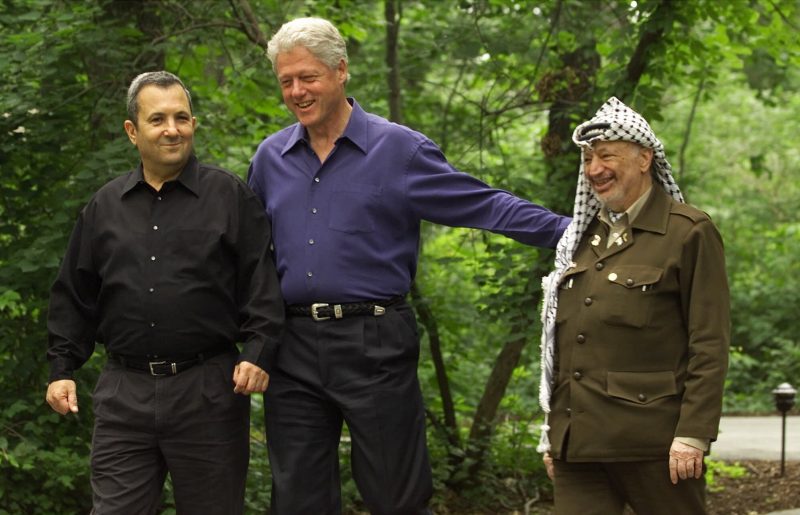Israeli forces invaded a West Bank city on Monday, killing at least eight people and injuring dozens more, according to the Palestinian Health Ministry.
It was Israel’s largest military operation in the West Bank since the early 2000s — since a period of violence and unrest that began months after a July 2000 Camp David summit President Bill Clinton had brokered in search of a peace agreement.
This story, on Clinton’s great “gamble,” originally ran in The Washington Post on July 26, 2000.
Just before the Camp David peace talks got underway, President Clinton confided to an aide that the whole process was the equivalent of what in football is called a Hail Mary pass — a go-for-broke play with time running out.
In the world according to Bill Clinton, however, that did not necessarily mean he thought prospects were so dim. A president and politician whose governing style has often been woven with a measure of chaos, and who seems to summon his best efforts on the brink — after all-nighters and impasses and brushes with disaster — had seen success in similar circumstances before.
This time, though, the old rhythms of Clinton’s career failed him; the Hail Mary pass went bouncing on the ground. Certainly, the last-minute heroics of the past two weeks at Camp David were as impressive as any during Clinton’s tenure, including nearly round-the-clock sessions since Sunday night — a final sprint for peace that began as soon as Clinton stepped off a 13-hour flight from Japan. But, in the end, the disputes between Israelis and Palestinians proved impervious to Clinton’s brand of charm, cajolery and crisis management.
Appearing in the White House briefing room yesterday, just before getting on yet another flight — this one to Arkansas for the funeral of an old friend — the president’s eyes had bags and his voice was hoarse. Yet while Clinton’s Camp David team stood with slumped shoulders by the side of his room, their leader seemed surprisingly upbeat.
“I’m not trying to put a funny gloss on this,” he said. “They couldn’t get there. That’s the truth.” But then he did put a sunny-side-up gloss on the proceedings: “I think on balance, it was very much the right thing to do, and it increases the chance of a successful agreement, and it increases the chances of avoiding a disaster.”
No place taxes Clinton’s eternal optimism more than the Middle East, a land of eternal conflict. But aides say he remains hopeful that some agreement between Israelis and the Palestinian Authority can be reached before Sept. 13, when Palestinian leader Yasser Arafat has vowed to unilaterally declare statehood.
“There’s certainly disappointment on his part, but this is a never-say-die guy,” said White House national security adviser Samuel R. “Sandy” Berger. Berger rejected a common Washington view of what was at stake for a president with only six months left to serve: “This is not a political calculation; it’s not about legacy. It’s about whether there’s going to be peace or violence in the fall.”
But other Clinton friends say it is at least partly about legacy, that Clinton devoutly hopes a Middle East deal can be credited to his account in history, and believes that after years of dealing with the parties he is in a unique position to bring it about. Clinton himself once said that he viewed striving for Middle East peace as part of his “personal journey of atonement” for his misdeeds in the Monica S. Lewinsky scandal.
Whatever mix of motivations inspired him, the past two weeks showed Clinton using his persuasive abilities to full effect. One aide recalled peering through the windows of Clinton’s Aspen cabin at Camp David this week, as Clinton in a private meeting with Arafat tried to urge flexibility on his position on Palestinian claims to Jerusalem’s Old City. “It was vintage Lyndon Johnson,” said the aide, “standing literally inches from his face, his hand on his shoulder coaxing and cajoling.”
This was not the only time Clinton had brought pressure down on the Palestinians. In the third day of the talks, one participant in the talks said he erupted at what he viewed as unreasonable positions by the Palestinians about the borders for a new state. “This is ridiculous, this is no way to negotiate,” Clinton said, according to one aide in attendance.
Clinton’s temper is an instrument with many notes. He often snaps and bristles over relatively inconsequential things, like an overbooked schedule or a news story he feels does not give him proper credit. “Usually he gets mad in inverse proportion to the importance of things,” said one aide. At Camp David, aides said Clinton was cooler than his staff, and the occasional flashes of anger seemed to be for calculated effect.
“Because he was almost always calm, when he got angry, it seemed seismic,” said Berger.
If Clinton’s personal presence at times proved decisive with the parties, there was also a downside: by the end, the Israelis and Palestinians proved unable to move on anything without Clinton himself striking the deal. At summit’s opening, Clinton mostly dealt leader-to-leader with Arafat and Israeli Prime Minister Ehud Barak; by the close, he was plunged into detailed bargaining with lower-ranking negotiators on the two delegations, a highly unusual circumstance for a U.S. president.
The delegations might share information or signal wiggle room with Berger or Secretary of State Madeleine K. Albright, one White House official said, “but they wouldn’t close [a deal] unless he [Clinton] was in there putting the wood to them.”
On Sunday night, for instance, he worked through the night on the details of security issues between Israelis and Palestinians, aides said, striking a deal by dawn. During the day, Clinton then turned to similar line-by-line negotiating on return of refugees, and borders for a Palestinian state. While these talks made decent headway, sources said, it became clear there could be no comprehensive deal without an agreement on the status of Jerusalem.
That sent Clinton back into high-level talks with Arafat and Barak. In the early hours of Tuesday, White House aides said it became clear no breakthrough was in the offing. That meant any progress on other issues was effectively nullified. One White House aide likened the talks to “the world’s biggest Rubik’s Cube: Everytime you introduced a new element, it changed the equation on everything else.”
The question now, for Clinton and the peace process, was whether the Camp David experience has changed the equation in ways that might yield later success. A U.S. proposal to draft a statement on things the parties had tentatively agreed on was greeted coldly by both sides, particularly the Palestinians, a White House official said.
But former White House senior adviser Rahm Emanuel, who still talks with Clinton, said the negotiators “touched a lot of third rails” — including the issues of Palestinian borders and refugees — and the leaders “are still standing and they’re not in the witness protection program.” A summit failure, he said, may be the necessary prerequisite for a later success.
Shibley Telhami, a University of Maryland expert on Mideast issues, praised Clinton’s efforts at Camp David as “courageous,” but questioned whether his “graduate student” mentality of hoping that all things can come together with a heroic final effort showed “a peculiar absence of realism.”



























